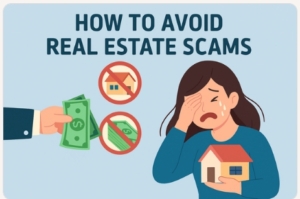In Nigeria, the dream of owning a plot of land or a house is a powerful one. It represents security, success, and a legacy for future generations. Tragically, this very dream is what fraudsters and “Omo-onile” love to exploit. The real estate market, particularly in booming cities like Lagos, Abuja, and Port Harcourt, is riddled with sophisticated scams that have left many hard-working Nigerians heartbroken and financially ruined.
The good news is that with knowledge and vigilance, you can confidently navigate this landscape and secure your investment. This guide is your shield. We will walk you through the most common scams and the practical, step-by-step checks you must perform to avoid them.

How to Avoid Real Estate Scams in Nigeria: Know These And Know Peace
Part 1: Know The Common Real Estate Scams in Nigeria
Before you can protect yourself, you need to know your enemy – that is the different forms it can take. Keep the following in the back of your mind, and shine your eyes as you go house (or land) hunting.
1. The “Omo-onile” (Land Grabbers) Menace: This is perhaps the most uniquely Nigerian scam. You buy a piece of land from a seller, only to have individuals claiming to be the original family landowners (“Omo-onile”) show up to demand outrageous fees and levies, often with threats and intimidation. Sometimes, the seller you dealt with had no legitimate claim to the land in the first place.
2. The Fake Agent and Phantom Property: Scammers create fancy brochures and websites for non-existent estates or properties in high-demand areas. They use pressure tactics, offering “once-in-a-lifetime” discounts to get you to pay a deposit quickly. Once the payment is made, they vanish into thin air.
3. The Forged Document Specialist: This fraudster may even have physical access to a property. They use sophisticated means to forge Title Documents, Certificates of Occupancy (C of O), and Governor’s Consent. The documents look so real that they can fool an untrained eye. You pay for the property, only to discover later that the documents are counterfeit and the real owner is out there.
4. The “One Land, Multiple Sales” Trick: Unfortunately, the Nigerian real estate scene is riddled with this type of problem. An unscrupulous landowner or agent sells the same plot of land to multiple buyers. They collect deposits or even full payments from all of them, creating a tangled web of ownership that can take years in court to resolve.
5. The Unapproved Estate Development: An unapproved estate development is a real estate scam – one that may take years to play out! You are sold a plot in a beautiful, planned estate with promises of roads, water, and electricity. You pay, only to find out later that the developer has no approval from the necessary government bodies (like the Lagos State Physical Planning Permit Authority). Your property is essentially illegal and could be demolished by the government.
Part 2: Your Step-by-Step Shield: Due Diligence is Non-Negotiable
Avoiding these scams is not about luck; it’s about a process called “due diligence.” This is your personal investigation. Do not skip any of these steps.
Step 1: Verify the Seller/Agent’s Identity and Legitimacy
For Companies: Is the real estate company registered with the Corporate Affairs Commission (CAC)? Ask for their RC Number and verify it on the CAC website. A legitimate company will have a physical office, not just a P.O. Box or a flashy car they use for meetings. In fact, the flashier the car, the higher you should raise your eyebrows.
For Individuals: Demand a government-issued ID (Driver’s License, International Passport, or National ID card). Take a copy and verify the details. Be wary if the seller is evasive or reluctant to provide this.
Step 2: The Critical Site Visit – Go Physically!
This cannot be overstated. NEVER buy land or property you have not physically visited. There is almost always a difference between the pictures and the physical structure.
Go with a Trusted Person: Take a friend or family member. A second pair of eyes is helpful, and scammers or other criminals are less likely to strike when witnesses are present.
Visit at Different Times: See the property during the day and, if possible, in the evening. This helps you assess the environment, traffic, and security situation.
Engage the Neighbours: Speak with people already living in the area. Ask them simple questions like, “How long have you lived here?” or “Who is the original landowner?” Their answers can be incredibly revealing. They might tell you if there have been disputes or if the person you’re dealing with is a known fraudster.

Step 3: The Document Authentication – This is Where the Battle is Won or Lost
This is the most technical but most crucial part. If you are not a lawyer, hire one.
Request for the Title Documents: The seller must provide the root title. This could be a:
Certificate of Occupancy (C of O): Issued by the state government.
Governor’s Consent: The approval for the transfer of a C of O.
Registered Deed of Assignment/Conveyance: A document showing the transfer of ownership from a previous owner.
Gazette: For excised lands.
Conduct a Land Search at the State Lands Registry:
Yes, they have shown you a piece of paper, but you need to know if its worth anything. The official way to confirm the true owner of a property is to search the land registry. Your lawyer will do this. The search will reveal:
* The genuine owner on record.
* Whether the land has any government acquisition or reservation.
* If there are any existing mortgages, liens, or court cases (encumbrances) on the property.
Verify the C of O with the Issuing Authority:
A forged C of O is common. Take the document to the relevant State Lands Bureau (e.g., Alausa Secretariat in Lagos) to confirm its authenticity. They will have a record of every genuine C of O issued.
Check for Survey Plans:
The land must have a Survey Plan prepared by a registered Surveyor. This plan has a unique number that can be verified at the Office of the Surveyor-General of the state. This confirms the exact boundaries and size of the land you are buying.
For Estates: Confirm Government Approvals:
If you are buying into an estate, ask the developer for their Approved Layout Plan from the state’s physical planning authority (e.g., LASPPPA in Lagos). This proves the government has approved the development of that area as an estate.
Step 4: Be Wary of the Transaction Process
Say No to Cash Payments: Never make large payments in physical cash. It is untraceable. Always use bank transfers, bank deposit, or cheques. This creates a paper trail and proves you made the payment so that if anything goes wrong, you know where to start to get your money back.
Escrow Services are Your Friend: For major developments, suggest using an escrow service. This is where a neutral third party (often a bank or lawyer) holds the funds until certain conditions are met, like the completion of the title documentation transfer. This protects both the buyer and the legitimate seller.
Get a Receipt: For every payment, no matter how small, get a signed and stamped receipt from the company or individual.
Part 3: Red Flags You Must Never Ignore
These are some of the common tricks that scammers employ. Shine your eyes; walk away immediately if you notice any of these:
Pressure to Pay Quickly: “This offer is only for today!” or “Three other people are interested, so you must pay a deposit now!” This is a classic scammer tactic to stop you from thinking clearly and doing your due diligence.
Prices That Are Too Good to Be True: If the price is significantly lower than the market rate for that area, it is almost certainly a scam. Greed is the scammer’s best weapon.
Reluctance to Provide Documents: If the seller gives excuses like “The documents are with my lawyer abroad” or “We can do the documentation after you pay,” or, “The seller wants to know that you are serious first” run. A legitimate seller is proud of their clean documents.
Emotional Stories: Be cautious of sellers who use sob stories to justify a quick sale. It’s often a manipulation tactic.
The “Exclusive” Agent: An agent who refuses to let you meet the direct owner or see the property without them present might be hiding something.
Conclusion
The cost of hiring a lawyer to conduct due diligence and verify your documents is a tiny fraction of the cost of the property itself. See it not as an expense, but as a critical investment in your peace of mind. It is the price you pay to ensure that your dream of land ownership does not turn into a decade-long legal nightmare.
In the Nigerian real estate market, the old saying holds true: “If you think hiring a professional is expensive, wait until you hire an amateur.” Be smart, be thorough, and be patient. Your dream property is out there, and by following these steps, you will secure it safely and legally, building a legacy that no scammer can ever take away.


